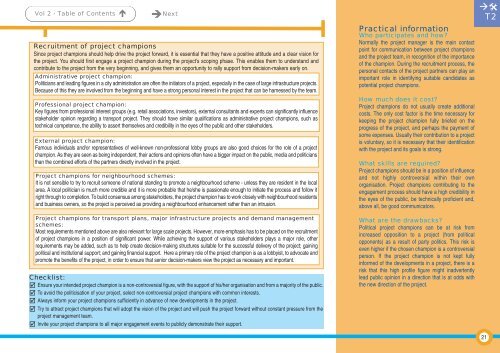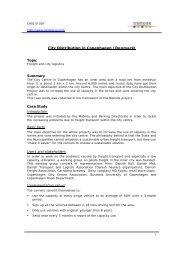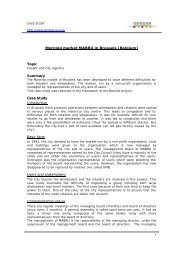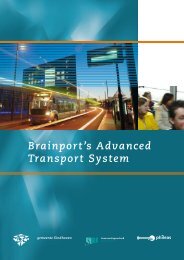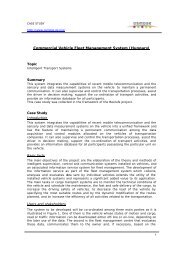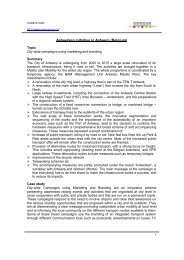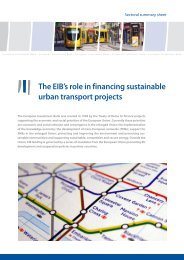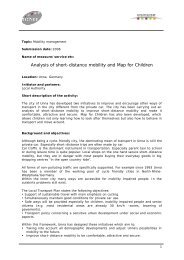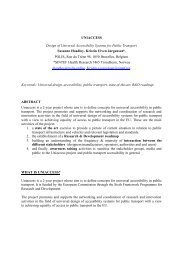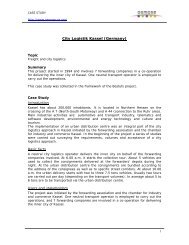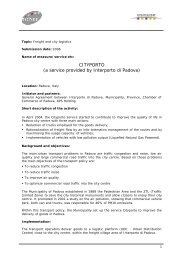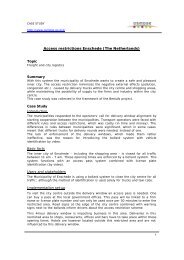Successful transport decision-making - Osmose
Successful transport decision-making - Osmose
Successful transport decision-making - Osmose
Create successful ePaper yourself
Turn your PDF publications into a flip-book with our unique Google optimized e-Paper software.
Vol 2 - Table of Contents Next Practical information<br />
Who participates and how?<br />
Recruitment of project champions<br />
Since project champions should help drive the project forward, it is essential that they have a positive attitude and a clear vision for<br />
the project. You should first engage a project champion during the project's scoping phase. This enables them to understand and<br />
contribute to the project from the very beginning, and gives them an opportunity to rally support from <strong>decision</strong>-makers early on.<br />
Administrative project champion:<br />
Politicians and leading figures in a city administration are often the initiators of a project, especially in the case of large infrastructure projects.<br />
Because of this they are involved from the beginning and have a strong personal interest in the project that can be harnessed by the team.<br />
Professional project champion:<br />
Key figures from professional interest groups (e.g. retail associations, investors), external consultants and experts can significantly influence<br />
stakeholder opinion regarding a <strong>transport</strong> project. They should have similar qualifications as administrative project champions, such as<br />
technical competence, the ability to assert themselves and credibility in the eyes of the public and other stakeholders.<br />
External project champion:<br />
Famous individuals and/or representatives of well-known non-professional lobby groups are also good choices for the role of a project<br />
champion. As they are seen as being independent, their actions and opinions often have a bigger impact on the public, media and politicians<br />
than the combined efforts of the partners directly involved in the project.<br />
Project champions for neighbourhood schemes:<br />
It is not sensible to try to recruit someone of national standing to promote a neighbourhood scheme - unless they are resident in the local<br />
area. A local politician is much more credible and it is more probable that he/she is passionate enough to initiate the process and follow it<br />
right through to completion. To build consensus among stakeholders, the project champion has to work closely with neighbourhood residents<br />
and business owners, so the project is perceived as providing a neighbourhood enhancement rather than an intrusion.<br />
Normally the project manager is the main contact<br />
point for communication between project champions<br />
and the project team, in recognition of the importance<br />
of the champion. During the recruitment process, the<br />
personal contacts of the project partners can play an<br />
important role in identifying suitable candidates as<br />
potential project champions.<br />
How much does it cost?<br />
Project champions do not usually create additional<br />
costs. The only cost factor is the time necessary for<br />
keeping the project champion fully briefed on the<br />
progress of the project, and perhaps the payment of<br />
some expenses. Usually their contribution to a project<br />
is voluntary, so it is necessary that their identification<br />
with the project and its goals is strong.<br />
What skills are required?<br />
Project champions should be in a position of influence<br />
and not highly controversial within their own<br />
organisation. Project champions contributing to the<br />
engagement process should have a high credibility in<br />
the eyes of the public, be technically proficient and,<br />
above all, be good communicators.<br />
<br />
T2<br />
Project champions for <strong>transport</strong> plans, major infrastructure projects and demand management<br />
schemes:<br />
Most requirements mentioned above are also relevant for large scale projects. However, more emphasis has to be placed on the recruitment<br />
of project champions in a position of significant power. While achieving the support of various stakeholders plays a major role, other<br />
requirements may be added, such as to help create <strong>decision</strong>-<strong>making</strong> structures suitable for the successful delivery of the project; gaining<br />
political and institutional support; and gaining financial support. Here a primary role of the project champion is as a lobbyist, to advocate and<br />
promote the benefits of the project, in order to ensure that senior <strong>decision</strong>-makers view the project as necessary and important.<br />
Checklist:<br />
Ensure your intended project champion is a non-controversial figure, with the support of his/her organisation and from a majority of the public.<br />
To avoid the politicisation of your project, select non-controversial project champions with common interests.<br />
Always inform your project champions sufficiently in advance of new developments in the project.<br />
Try to attract project champions that will adopt the vision of the project and will push the project forward without constant pressure from the<br />
project management team.<br />
Invite your project champions to all major engagement events to publicly demonstrate their support.<br />
What are the drawbacks?<br />
Political project champions can be at risk from<br />
increased opposition to a project (from political<br />
opponents) as a result of party politics. This risk is<br />
even higher if the chosen champion is a controversial<br />
person. If the project champion is not kept fully<br />
informed of the developments in a project, there is a<br />
risk that this high profile figure might inadvertently<br />
lead public opinion in a direction that is at odds with<br />
the new direction of the project.<br />
21


